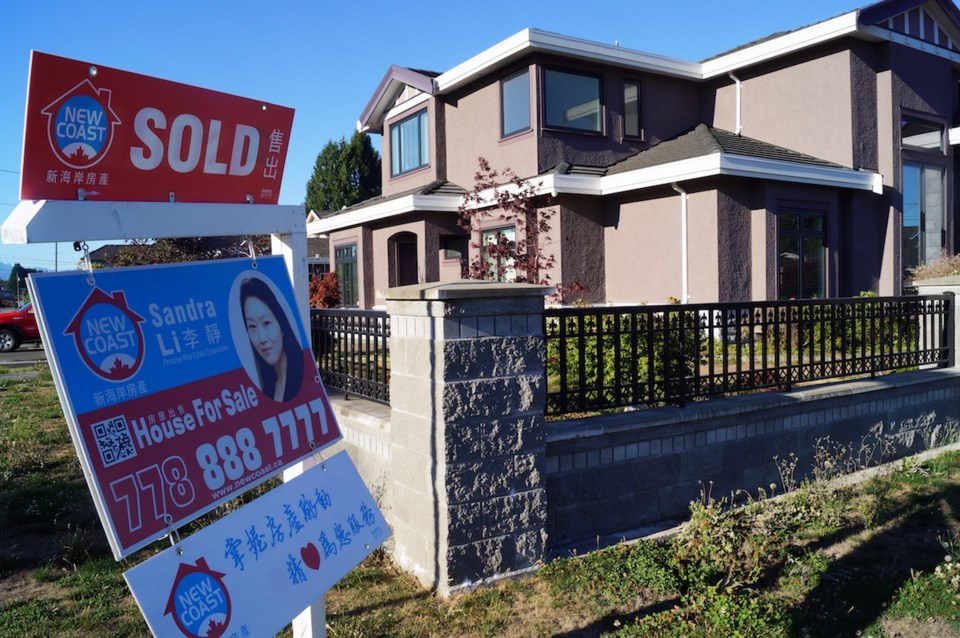According to a small window of data collected by the provincial government on residential real estate purchases in B.C., only 3.3 per cent was sourced from foreign nationals.
However, those figures were higher in Metro Vancouver, with one city standing out in particular — Richmond.
Numbers crunched by the B.C. government during a 19-day period in June of this year, revealed that one in seven property transfers, or 14.3 per cent, on Lulu Island involved a foreign national (defined by the government as someone who is not a permanent resident or a Canadian citizen).
The data was released Thursday afternoon by Finance Minister Mike de Jong, and was quickly criticized and questioned by local academics and the opposition NDP.
“Today, they’re content to ignore warnings from our national banks, from FINTRAC, and from academics, because they’ve collected 19 days of self-reporting data on citizenship status. It’s incredible,” said NDP housing spokesperson David Eby.
The data was collected after the provincial government began asking home buyers if they are a Canadian citizen or a permanent resident. DeJong stated 90 per cent of all foreign purchasers were from China.
Tom Davidoff, director of the UBC Centre for Urban Economics and Real Estate, called the data “imperfect” and told the Richmond News that it’s important to understand the source of all capital flowing into the hot real estate market.
For instance, offshore money can be funneled by foreigners to relatives and businesses, or permanent residents and citizens may be bringing in money on their own.
Either way, noted Davidoff, the data on foreign nationals doesn’t paint the entire picture of why Metro Vancouver’s housing market is unaffordable to local buyers, as housing prices far outstrip upper middle-class, local incomes.
“I don’t think we learned the extent outside money is driving the market,” said Davidoff, adding it’s important to keep in mind that, overall, other factors such as low interest rates, a weak Canadian dollar and home equity loans are part of a growing red flag.
Furthermore, the short window of data may not be entirely accurate, granted June showed a relative slowdown in the market, noted Davidoff, who said a more telling set of data would have been income data on home purchases. “The data I would (want) wouldn’t have China in it,” he said. “I think it was kind of weird to focus on nationality.”
Nevertheless, Richmond’s real estate market was the most influenced in B.C. by foreigners.
From June 10-19, records showed there were 392 residential property transfer transactions in Richmond.
Foreigners accounted for 56 of those transactions, or 14.3 per cent. Of the $432 million that changed hands in Richmond, foreigners handled $62 million. The data showed foreigners were buying properties with the same average value as local purchasers.
Meanwhile, Burnaby showed the second largest share of foreigners purchasing properties, at 10.9 per cent. Vancouver’s share was 4.1 per cent, although it had the most foreign purchases, at 1,139 units.
Davidoff said money flowing from China is “absolutely the story of the last 12 months,” whereby the benchmark price of a single detached home in Richmond has risen 48.5 per cent, more than any other jurisdiction in Metro Vancouver (a typical home now costs $1.7 million). Even townhouse prices have punched above the $700,000 mark, now sitting at $709,000, on average. Aside from Point Grey in Vancouver, no other jurisdiction has shown a greater rise in detached home prices in B.C., over the past decade, than Richmond.
On Monday, Eby was quick to pounce on Premier Christy Clark, after the Vancouver Sun reported the Quebec government-run immigrant investor program received a record-breaking number of rich immigrants coming to Canada on a cash-for-citizenship scheme.
Eby said the provincial government has been silent on the matter, as property transfer taxes bolster the B.C. government’s coffers and new construction jobs account for the majority of job growth.
According to data from UBC geographer David Ley, Richmond has one of the highest rates of settlement by immigrant investors, who continue to flock to B.C., via Quebec, after the national program was cancelled in 2014.
Meanwhile, federal Immigration Minister John McCallum recently told the Sun that he has no intention of challenging Quebec’s immigration policy that sees foreigners with $1.6 million in assets get an express lane to citizenship with an $800,000 loan to the government (which is returned, interest free, after five years).
At issue is data showing, on average, such immigrants in the program reporting less income than refugees.
Clark’s government maintains it is helping housing affordability, stating Thursday that, in 2016, it introduced the Newly Built Home Exemption, which saves new home buyers up to $13,000 in property transfer taxes. The exemption is in line with Clark’s push for more housing supply in the region.



